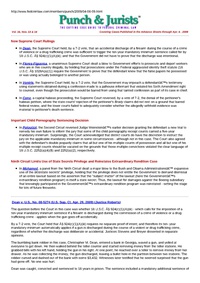In U.S. v. Polizzi, 549 F.Supp.2d 308 (E.D.N.Y. Apr. 1, 2008) (P&J, 03/03/08), District Judge Jack Weinstein of the E.D.N.Y. issued another of his long list of distinguished (and often controversial), and lengthy (here 188 pages) decisions in which he vacated Peter Polizzi’s (a/k/a Peter Polouizzi) twelve convictions for …
In a forceful decision with potentially far reaching consequences, a panel from the Ninth Circuit dealt a huge blow to the claims of both the Bush Administration and the Obama Administration that, whenever the Executive Branch asserts the so-called “state secrets privilege, “the judiciary should effectively cordon off all …
Sentence for tax evasion is affirmed where district court properly applied an abuse of trust sentencing enhancement under the United States Sentencing Guidelines as the defendant's tax evasion was part of a larger scheme, an integral part of which involved abusing a position of trust. The sentence was also …
Conviction and sentence for being a felon in possession of a firearm is affirmed where the district court's application of a sentencing enhance under the United States Sentencing Guidelines and reliance on the application note contained in the 2006 edition of the Guidelines does not violate the Ex Post …
In this lengthy and long-awaited decision regarding the Government's authority to detain individuals suspected of supporting terrorist organizations, District Judge Walton essentially adopted “the government’s standard for detention . . . subject [only] to the interpretation of that standard provided by the Court.” Although Judge Walton criticized the “ephemeral …
Ruling en banc, a divided Sixth Circuit reversed a prior panel decision which held that the petitioner, Thomas Nichols, has been denied the effective assistance of counsel by his attorney’s failure to argue that it was improper to enhance his sentence based on facts that had not been proved …
In this decision, the Third Circuit upheld a new prison mail policy implemented by the Pennsylvania Department of Corrections (DOC) in 2002 which effectively allowed prison officials to open mail addressed from the courts and legal counsel outside the presence of the inmates to whom the mail was addressed, …
Sentence is reversed and remanded where sentencing enhancement under the United States Sentencing Guidelines for a prior aggravated felony should not be applied, as neither of defendant's two felony convictions for simple drug possession are considered an aggravated felony justifying enhancement.
[Editor's Note: For a commentary on this decision, …
Sentence for assault in aid of racketeering activity is upheld where the district court did not engage in impermissible "double counting" of a sentencing factor when it departed upward from the recommended statutory sentencing guidelines pursuant to U.S.S.G. § 5K2, as the upward adjustment was reasonable and not legal …
In this case, the Court addressed a Circuit split over the scope of the mens rea requirement in one of the many obtuse mandatory minimum Congressional statutes - namely, the Federal “aggravated identity theft” statute. That statute, which is codified at 18 U.S.C. § 1028A(a)(1), imposes a mandatory two-year …
To best understand the issues before the Supreme Court in this capital sentencing case, one should start with Justice Stevens’ concluding paragraph where he observed:
“In the 27 years since Gary Cone was convicted of murder and sentenced to death, no Tennessee court has reached the merits of his …
The question before the Court in this case was whether a defendant's voluntary incriminating statements made to a jailhouse informant are admissible to impeach the defendant’s conflicting statements - in a case where the State conceded that the jailhouse interrogation had violated the defendant’s Sixth Amendment rights.
In an …
The question before the Court in this case was whether 18 U.S.C. § 924(c)(1)(A)(iii) - which calls for the imposition of a ten-year mandatory minimum sentence if a firearm is discharged during the commission of a crime of violence or a drug trafficking crime - applies when the gun …
